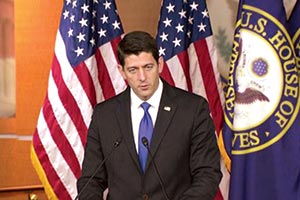Senior Reporter
Funding Proposal Would Last Into Late Spring, Ryan Says

This story appears in the Dec. 5 print edition of Transport Topics.
Funding for government agencies is expected to go beyond March in a bid to give Trump administration officials a voice in the congressional appropriations process next year, House Speaker Paul Ryan (R-Wis.) said Dec. 1.
The speaker explained he intends to help ensure Senate counterparts have ample time to confirm Trump White House cabinet and judicial nominees. Ryan and other leaders also said the GOP-led Congress will look to update health care and financial regulatory policies next year at the start of Trump’s administration.
“We wanted to bring in the new Republican government in place so we can negotiate appropriations with that government, which we think it’s going to be much better negotiations than with the existing government that we have a lot of problems with the way they spend money,” Ryan told reporters.
Opting for a short-term funding bill, known as a continuing resolution, or CR, that would expire near the Memorial Day holiday instead of passing an end-of-year fiscal 2017 omnibus legislation would remove a major policy vote during the next administration’s first 100 days, Ryan explained.
The speaker had proposed a shorter funding extension last month. Skipping the fiscal 2017 funding bill that would have expired Sept. 30 is likely to pause the advancement of trucking policy matters during this lame duck session of Congress.
The trucking industry’s priorities for the lame duck included advancing an update to an hours-of-service rule for truckers and a pre-emption of a meal and rest break rule. American Trucking Associations indicated a short delay of an omnibus bill would “only increase the likelihood that these two ATA priority issues are passed.”
Ryan indicated the House would unveil the short-term funding fix this week and then schedule a floor vote before a Dec. 9 funding deadline. Government funding authority expires on that date.
Democrats protested the need for a short-term bill that would allow Trump officials to dictate funding priorities next year. They continue to urge Ryan and other Republicans to advance the omnibus funding bill that would expire Sept. 30.
“I prefer a three-month or a yearlong” funding bill, Maryland Sen. Barbara Mikulski, the Appropriations Committee’s top Democrat, told reporters. And House Minority Leader Nancy Pelosi (D-Calif.) called a short-term bill a mistake. Pelosi will stay on as the leader of her caucus for the next two years after beating back a challenge by Ohio’s Tim Ryan on Nov. 30.
Meanwhile, Democrats on the House transportation policy committee urged Republican funding leaders last week to ensure the short-term funding bill would reflect last year’s congressionally approved increases for infrastructure accounts. The Democrats’ concern is that Republicans will look to advance a short-term measure that would stick to fiscal 2016 appropriated levels for infrastructure projects, instead of fiscal 2017 levels.
“These increases include $1.85 billion for highways, $432 million for public transit and $85 million for highway safety. Moreover, the increased public transit investment includes $199 million from the Highway Trust Fund for grants to help public transit agencies and commuter railroads,” the Democrats wrote.
Turning to President-elect Donald Trump’s first 100 days, House Majority Leader Kevin McCarthy (R-Calif.) pushed back on the notion GOP leaders would honor President-elect Donald Trump’s campaign pledges during his first 100 days. A $1 trillion investment in infrastructure over 10 years through tax credits for private investors is among those pledges.
“I’m not going to put any timelines on us on the first 100 days,” McCarthy said last week. “I want to get it done right. I put more days in [the 2017 congressional calendar] so we get this done. I think there’s always a window. We know in an election year, things are harder than the first year.”
The House lame duck session for the 114th Congress is scheduled to adjourn Dec. 16. McCarthy scheduled convening the House for the 115th Congress on Jan. 3. Senate leaders have not stated dates for adjournment and reconvening.




